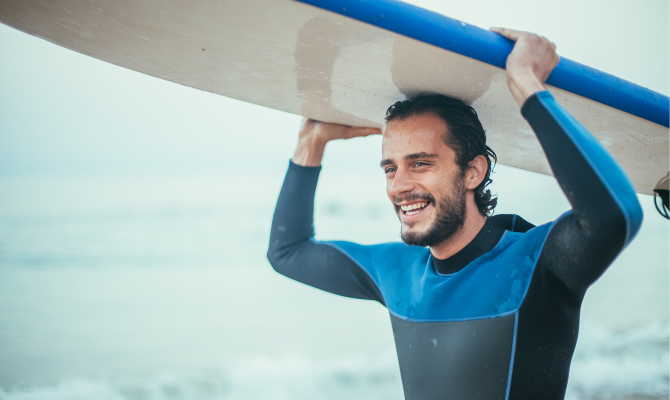Keeping Up Your Exercise Over the Holidays
19 Nov 2020
19 Nov 2020

You may be starting to feel more energised and thinking of a new fitness goal for the summer period. All of these goals involve moving the body and may result in a few aches and pains which is completely normal. The biggest thing that will get in the way of your goals, apart from not exercising and social functions, is injury.
When it comes to performance and injury there are two major components, these being load and capacity.
Load: How much weight we put on our body and/or the duration/intensity of exercise.
Capacity: The body’s ability to adapt to the load you put on your body.
Injury occurs when we put too much load on our body too quickly, exceeding our capacity. e.g. Attempting to squat 80 kg when your previous maximum was 40 kg the week before. It can also occur when we have an extended period of inactivity or reduced capacity (such as winter hibernation), and we believe we can do the same activity we did before the break. e.g. I could run 10 km before winter, so I will start with a 10 km run now. Therefore, to stay injury free it is a balance between load and capacity.
It is a balance of these two because you need to challenge your body to see adaption/change in your capacity, but if you load too quickly you can exceed your current capacity. Research has shown us that the sweet spot for adaption is a 10-15 per cent increase on your previous week's load.
Type: The type of activity. This may be cardio, weight lifting, speed work, long distance running, high intensity or even type of training within a certain modality. e.g. For weight lifting we may do pyramid training, eccentric load, supersets, etc.
Frequency: How often you train within a certain time period. This may be a day, a week, a month or even a year. This is also known as periodisation.
Intensity: How hard you train and how much effort you put into each session. This can be measured through heart rate, rate of perceived exertion (RPE), 10 RM (consecutive exercise repetitions), distance, etc.
Duration: How long each of your sessions last.
Terrain: The environment where we do our activities such as the gym, road, trail, pitch, turf, swimming pool, open water, etc.
Equipment: Type of shoes, weights, clubs, etc.
Medical conditions/illness: Different conditions or illness can put added strain on our bodies. Therefore it is important to listen to your bodies response from exercise.
Emotional stress/thoughts: Our day-to-day life stressors of work, home and social environments can impact on what load we can put on our body. If we are under emotional stress, physical stress from exercise can be positive but also negative.
When you think about staying injury free you need to think about all of these components, but one of the most important aspects that has come to the forefront in recent years is the impact of recovery and the reduction of injury. You can have the best laid plans when it comes to loading, but if you don’t recover well between sessions, it can be your undoing.
The term recovery is an umbrella term for a number of components. This includes sleep, nutrition, stretching, massage and meditation or self-awareness. In my view, if we get enough sleep (8 hours per night), eat a balanced diet, stretch when required and maintain self-awareness, we can reduce the impact of emotional stress and illness on our body and have a direct effect on load.
At Habit Health we have numerous professionals that can assist across different aspects to manage load and recovery.
So if you want to put your best foot forward and live your best life this summer, talk to one of our friendly experts about how to stay injury-free over summer.
| Aaron Searle is a Lead Physiotherapist at Habit Health Wellington |